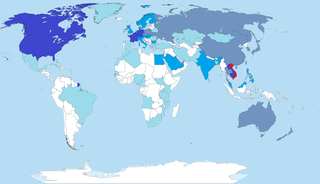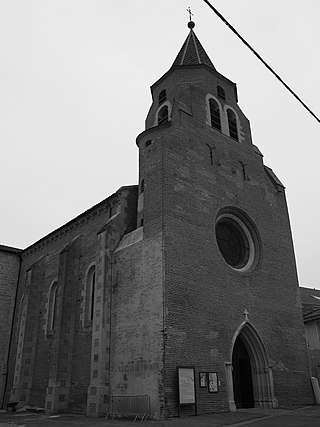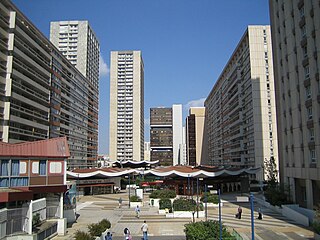| Total population | |
|---|---|
| ~14,000 (2012 est.) [1] | |
| Regions with significant populations | |
| Brussels, Liège | |
| Languages | |
| French, Vietnamese, Dutch, German | |
| Religion | |
| Vietnamese folk religion, Mahayana Buddhism | |
| Related ethnic groups | |
| Overseas Vietnamese, Vietnamese people in France, Vietnamese people in Germany, Vietnamese people in the Netherlands |
Vietnamese people in Belgium or Vietnamese Belgian refers to people of Vietnamese ancestry who were born in or immigrated to Belgium. The population of the community is about 14,000 as of 2012.
The first Vietnamese migrants to Belgium consisted of students and diplomats from South Vietnam beginning in 1965, when the South Vietnamese government sought for stronger relations with other Francophone nations following a minor rift with France. Belgium soon became a popular alternative to France for South Vietnamese students seeking higher education and career opportunities, especially in the cities of Brussels, Liège and Leuven. [1]
A much larger influx of Vietnamese immigrants arrived as refugees following the Fall of Saigon, beginning in 1978. Similarly to their counterparts in France, South Vietnamese refugees to Belgium were largely of higher socioeconomic standing and integrated much easier into their host country's society due to better linguistic and cultural knowledge than their peers who settled in North America, Australia and the rest of Europe. [2]
Following the fall of the Berlin Wall in 1989, a number of Vietnamese workers in former Soviet Bloc countries who were sponsored by the communist government of Vietnam sought asylum in Belgium. This included many guest workers in the former East Germany who were encouraged by the German government to be repatriated back to their home country following German reunification. [3]
A large proportion of the Vietnamese Belgian population resides in Brussels and the surrounding area, with a Vietnamese business district centered along Boulevard Anspach. The rest of the Vietnamese Belgian community is largely concentrated in the southern French-speaking Wallonia region, especially around the city of Liège. [1]
The Vietnamese community in Belgium maintains strong relations with its counterpart community in France. Before the establishment of Vietnamese businesses and community institutions in Belgium during the late 1970s, Vietnamese Belgians would travel to Paris for various purposes, such as buying Vietnamese grocery products and seeking immigrant needs. [1]
In terms of religion, the vast majority of Vietnamese Belgians are at least nominal Buddhists, following the Mahayana branch with influences from Confucian philosophy. The influx of Vietnamese immigrants into Belgium created a visible Buddhist community in the country, with temples serving as both spiritual and community centers, and have also attracted non-Vietnamese worshippers. [4]
The Vietnamese community in Belgium is largely well-integrated into Belgian society. Among immigrants from the former South Vietnam, initial strong knowledge of the French language allowed them to pursue studies and careers despite their recent arrival. While some Vietnamese immigrants did settle in the Flanders region and learned Dutch, most relocated to Brussels or Wallonia. Meanwhile, Belgian-born Vietnamese have extremely high rates of success in education, at many times outperforming their peers and having a high rate of enrollment in higher education. [1]

Belgium, officially the Kingdom of Belgium, is a country in Northwestern Europe. The country is bordered by the Netherlands to the north, Germany to the east, Luxembourg to the southeast, France to the south, and the North Sea to the west. It covers an area of 30,689 km2 (11,849 sq mi) and has a population of more than 11.5 million, making it the 22nd most densely populated country in the world and the 6th most densely populated country in Europe, with a density of 376/km2 (970/sq mi). Belgium is part of an area known as the Low Countries, historically a somewhat larger region than the Benelux group of states, as it also included parts of northern France. The capital and largest metropolitan region is Brussels; other major cities are Antwerp, Ghent, Charleroi, Liège, Bruges, Namur, and Leuven.

Walloons are a Gallo-Romance ethnic group native to Wallonia and the immediate adjacent regions of Flanders, France, Germany, Luxembourg and the Netherlands. Walloons primarily speak langues d'oïl such as Belgian French, Picard and Walloon. Walloons are primarily Roman Catholic, with a historical minority of Protestantism which dates back to the Reformation era.

Wallonia, officially the Walloon Region, is one of the three regions of Belgium—along with Flanders and Brussels. Covering the southern portion of the country, Wallonia is primarily French-speaking. It accounts for 55% of Belgium's territory, but only a third of its population. The Walloon Region and the French Community of Belgium, which is the political entity responsible for matters related mainly to culture and education, are independent concepts, because the French Community of Belgium encompasses both Wallonia and the bilingual Brussels-Capital Region but not the German-speaking Community of Belgium.

In Belgium, the French Community refers to one of the three constituent constitutional linguistic communities. Since 2011, the French Community has used the name Wallonia-Brussels Federation, which is controversial because its name in the Belgian constitution has not changed and because it is seen as a political statement. The name "French Community" refers to Francophone Belgians, and not to French people residing in Belgium. As such, the French Community of Belgium is sometimes rendered in English as "the French-speaking Community of Belgium" for clarity, in analogy to the German-speaking Community of Belgium.

Overseas Vietnamese refers to Vietnamese people who live outside Vietnam. There are approximately 5 million overseas Vietnamese, the largest community of whom live in the United States.

Belgians are people identified with the Kingdom of Belgium, a federal state in Western Europe. As Belgium is a multinational state, this connection may be residential, legal, historical, or cultural rather than ethnic. The majority of Belgians, however, belong to two distinct linguistic groups or communities native to the country, i.e. its historical regions: Flemings in Flanders, who speak Dutch; and Walloons in Wallonia, who speak French or Walloon. There is also a substantial Belgian diaspora, which has settled primarily in the United States, Canada, France, and the Netherlands.
Laotians in France consist of people of Lao ancestry who were born in or immigrated to France. The population as of 2019 is estimated to be 200,000.
Cambodians in France consist of ethnic Khmer people who were born in or immigrated to France. The population as of 2020 was estimated to be about 80,000 making the community one of the largest in the Cambodian diaspora. The Cambodian population in France is the most established outside Southeast Asia, with a presence dating to well before the Vietnam War and subsequent Indochina refugee crisis including the horrors of Pol Pot and the Khmer Rouge who took over in Phnom Penh on 17 April 1975. A few numbers of Cambodian people were able to escape and migrate to France before the Khmer Rouge took power in Cambodia as the Cambodian Civil War came to an end and overthrow U.S.-backed military dictatorship of Lon Nol and the Khmer Republic. His brother Lon Non and the other Khmer officials were arrested and executed by the CPK, the Marxist-Leninist dictatorship that seized power in Phnom Penh. 13 days before the Fall of Saigon and the Second Indochina War ended on 30 April 1975.
The Chinese diaspora in France consists of people of Chinese origin who were born in or immigrated to France. The ethnic Chinese population in France is estimated to be about 100,000-150,000, making it the largest overseas Chinese community in Europe.

The Kingdom of Belgium has three official languages: Dutch, French, and German.
The partition of Belgium is a hypothetical situation, which has been discussed by both Belgian and international media, envisioning a split of Belgium along linguistic divisions, with the Flemish Community (Flanders) and the French-speaking Community (Wallonia) becoming independent states. Alternatively, it is hypothesized that Flanders could join the Netherlands and Wallonia could join France.

Sainte-Livrade-sur-Lot is a commune in the Lot-et-Garonne department in south-western France.
Vietnamese people in the United Kingdom or Vietnamese Britons include British citizens and non-citizen immigrants and expatriates of full or partial Vietnamese ancestry living in the United Kingdom. They form a part of the worldwide Vietnamese diaspora.
The history of Wallonia, from prehistoric times to the present day, is that of a territory which, since 1970, has approximately coincided with the territory of Wallonia, a federated component of Belgium, which also includes the smaller German-speaking Community of Belgium. Wallonia is the name colloquially given to the Walloon Region. The French word Wallonie comes from the term Wallon, itself coming from Walh. Walh is a very old Germanic word used to refer to a speaker of Celtic or Latin.
Vietnamese people in France consist of people of full or partial Vietnamese ancestry who were born in or immigrated to France. Their population was about 400,000 as of 2017, making them one of the largest Asian communities in the country.
Asian diasporas in France or French Asians consist of foreign residents and French citizens originating from Asian countries living in France. French citizens of Asian descent primarily have ancestry from the former French colonies of Indochina, as well as China or Turkey. Other Asian ethnic groups found in France include other West Asians, South Asians, Japanese, and Koreans.
The Laotian diaspora consists of roughly 800,000 people, both descendants of early emigrants from Laos, as well as more recent refugees who escaped the country following its communist takeover as a result of the Laotian Civil War. The overwhelming majority of overseas Laotians live in just three countries: Thailand, the United States, and France.

The Quartier asiatique, also called Triangle de Choisy or Petite Asie is the largest commercial and cultural center for the population of Asian origin of Paris. It is located in the southeast of the 13th arrondissement in an area that contains many high-rise apartment buildings. Despite its status as a "Chinatown", the neighborhood also contains significant Vietnamese, Laotian and Cambodian populations.

Paris is home to the oldest Overseas Vietnamese community in the Western world and is also one of the largest outside Vietnam. There are an estimated 70,000 people of Vietnamese descent within the city limits of Paris as of 2018, with the greater Île-de-France area home to another estimated 100,000. Both figures make the Paris metropolitan area host to one of the greatest concentrations of Vietnamese outside Vietnam, if not the largest. They contains Vietnamese born- people that living in Paris (France) or French born-citizens of partially or full Vietnamese descent.
Moroccans and people of Moroccan descent, who come from various ethnic groups, form a distinct community in Belgium and part of the wider Moroccan diaspora. They represent the largest non-European immigrant population in Belgium and are widely referred to as Belgo-Marocains in French and Belgische Marokkanen in Dutch.